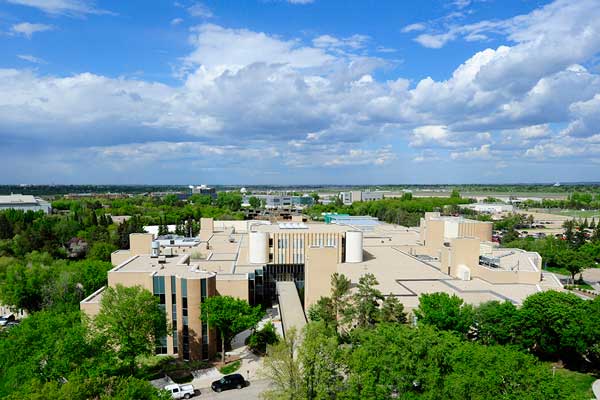
The Western College of Veterinary Medicine (WCVM) serves as the premier centre of veterinary education, research and clinical expertise for all of Western Canada.
The following website is applicable to western Canadians and individuals from the Canadian territories who meet the WCVM residency guidelines.
Through the Interprovincial Agreement (IPA), the western Canadian provinces (B.C., Saskatchewan and Manitoba) provide funding for a minimum of 88 first-year seats — including designated seats for Indigenous and agriculture-focused applicants.
Please note: residents of Alberta are not eligible to apply to the WCVM.
About
Veterinary medicine focuses on animal health and the study of diseases that affect all animal species. Veterinarians receive comprehensive training in all basic and clinical sciences with relation to a variety of species, including food‑producing animals, horses, companion animals, exotic pets and wildlife.
- Four-year degree. This doesn't include the two years of university-level studies that are required before admission to this program.
- Full-time program
- Academic year runs from mid-August to end of April
What you will learn
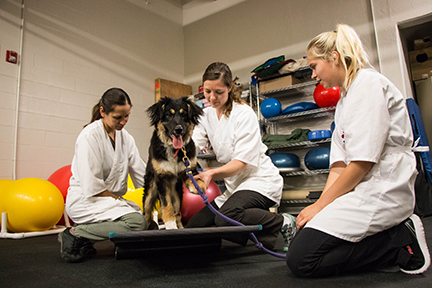
This program prepares you to meet the needs of animal health care in Western Canada and beyond. Our curriculum allows you to pursue personal interest areas including small, large or exotic animal care, surgery, medical imaging, anesthesiology, pathology, wildlife medicine, or animal-human health-related issues — just to name a few.
The veterinary curriculum is very diverse. You will learn about how the healthy body works, how it is disrupted and how to diagnose and treat various ailments. You will also learn about how animals are managed and how to keep them healthy.
You will gain hands-on experience with animals through formal laboratory exercises, elective courses and fourth-year rotations. You will also receive instruction in leadership, communication and practice management to prepare you for your future professional careers.
First two years
You will focus on basic and applied science core courses. You will learn about the functions of a healthy body and how they can be disrupted. Our new curriculum has an increased focus on clinical skills and ensuring that students have met vital competencies required to be a practising veterinarian.
Third year
You will gain more in‑depth, focused learning including hands-on experience in particular areas of interest through a range of core/elective courses.
Fourth year
You will gain clinical experience during the program's final year, completing a series of two- or four-week clinical rotations. Students can also arrange for externships at specialty practices, zoos and aquariums in other provinces or countries.
The Course and Program Catalogue has the complete and official listing of required classes and their descriptions for this program.
Why study here
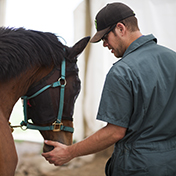
Veterinary Medical Centre (VMC)
The college's Veterinary Medical Centre is Western Canada's centre for primary and specialized clinical services, as well as for veterinary teaching and animal health research.
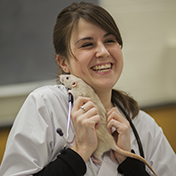
Diverse caseload
The WCVM Veterinary Medical Centre's diverse caseload ensures that veterinary students are exposed to a range of animal species and health issues during their senior years.
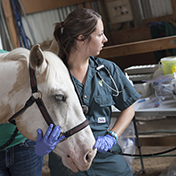
Undergraduate research program
One of the finest introductory research initiatives in North America, first- and second-year students have the opportunity to work alongside experienced researchers at the college, learning more about the world of research and gaining valuable, hands-on experience.
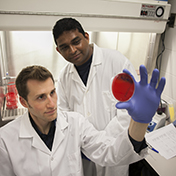
One Health
Veterinarians make ideal leaders of One Health, a global initiative for improving animal, human and environmental health through collaboration among all of the health sciences. That is especially true at USask — the only Canadian university with a full complement of health science colleges and schools on one campus.
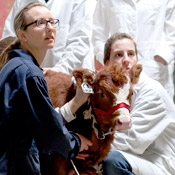
Agriculture
Veterinarians play a critical role in agriculture and production animal health, and the WCVM is well placed to educate new veterinarians in food animal medicine. USask's College of Agriculture and Bioresources and the WCVM also collaborate on many food animal research studies that contribute to the students' training.
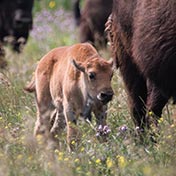
Livestock and Forage Centre of Excellence (LFCE)
The LFCE includes a 1,500-head beef cattle feedlot, a forage cow-calf facility, a livestock research unit, facilities for specialized livestock, and a production cow herd with over 400 breeding animals.
Careers
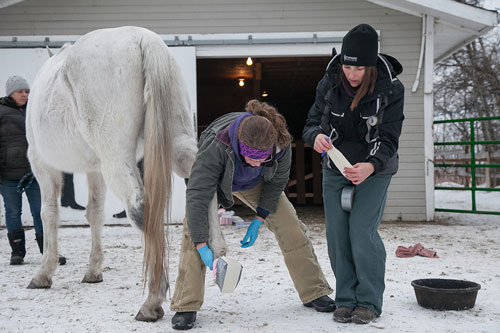
Private practice
Mixed animal practitioners treat large and small animals while large animal practitioners focus on agricultural livestock. Small animal veterinarians provide health care for dogs, cats and exotic pets. Some private practitioners specialize in treating individual species such as dairy and beef cattle, swine, horses or companion animals.
Specialized disciplines
Clinicians with advanced training provide specialized services in many clinical disciplines including surgery, internal medicine, medical imaging, anesthesiology, ophthalmology, veterinary pathology, dentistry, wildlife medicine and oncology.
Public service
Provincial and federal veterinarians help to develop public policy and legislation related to animal and animal human health. They regulate the import and export of livestock and food products. They are responsible for the control of infectious diseases among livestock and wildlife from a local to global level. They provide diagnostic services and ensure the health and safety of commercial meat products.
Academia and research
Veterinarians are involved in teaching and studying animal health at veterinary colleges, universities and research institutions. Veterinarians also contribute to advances in human medicine and collaborate with researchers around the world.
Industry
Veterinarians take part in the research and commercial development of new feed products, drugs and technologies with animal health companies.
International accreditation
The WCVM holds the status of full accreditation with the American Veterinary Medical Association (AVMA) Council on Education, allowing the WCVM to operate as a qualified centre for veterinary education and research.
WCVM graduates are eligible to practise in all provinces of Canada, in all American states and in most other countries around the world.
WCVM students write the North American Veterinary Licensing Examination (NAVLE) in the final year of the DVM program. The NAVLE is a comprehensive test that allows veterinarians to practise throughout North America. It is also accepted as a veterinary qualification in most other countries.
- The WCVM student pass rate for the NAVLE exam in the past three years has been 94 per cent (2024-25), 86 per cent (2023-24) and 97 per cent (2022-23) — well above the 80 per cent rate required by the American Veterinary Medical Association Council on Education. All veterinary graduates must pass the NAVLE before they can be licensed to practise in North America and in other parts of the world.
The WCVM's Veterinary Medical Centre is also an accredited members of the American Animal Hospitals Association (AAHA).
The college is recognized by the Royal College of Veterinary Surgeons (RCVS). This means WCVM graduates are eligible for membership in the RCVS, allowing them to practise in the United Kingdom and any country recognizing RCVS membership.
For further information about the WCVM’s accreditation, visit the WCVM website.
Saskatchewan student loan forgiveness
Saskatchewan veterinarians working in designated communities can apply to receive up to $20,000 over five years toward their provincial student loan balance. Learn about eligibility requirements and how to apply.
Tuition estimates
Interprovincial Agreement (IPA) seats
Tuition and fees per year
| IPA tuition | $15,456 |
|---|---|
| Student fees | $1,308.24 |
| Total | $16,764.24 |
Tuition estimates reflect a typical amount you could expect to pay per year (2025-2026 Canadian dollar rates).
Student fees are used to fund specific student benefits, including health, vision and dental coverage, a bus pass, recreational programs and fitness centre access.
Non-Interprovincial Agreement (non-IPA) seats
*Non-IPA seats were offered in fall 2020, fall 2021 and fall 2022. As of fall 2023, non-IPA seats are no longer offered at the WCVM.
Tuition and fees per year
| Tuition | $15,456 |
|---|---|
| Non-IPA seat rate* | $55,000 |
| Student fees | $1,308.24 |
| Total | $71,764.24 |
Tuition estimates reflect a typical amount you could expect to pay per year (2025-2026 Canadian dollar rates).
Student fees are used to fund specific student benefits, including health, vision and dental coverage, a bus pass, recreational programs and fitness centre access.
*Non-IPA seat: Non-Interprovincial Agreement seat. These student seats are not provincially subsidized by the WCVM's partner provinces and are subject to potential annual increases.
Additional estimates of fees and expenses
| Additional fees or expenses | Year 1 | Year 2 | Year 3 | Year 4 |
|---|---|---|---|---|
| WCVSA fees | $25 | $25 | $25 | $25 |
| Board examinations (NAVLE) | n/a | n/a | n/a | $1,000 |
| Sask. Veterinary Medical Association fees | $200 | $100 | $100 | $100 |
| TLD dosimeters | $0 | $0 | $0 | $30 |
| Laptop computer | $1,000 | $0 | $0 | $0 |
| Textbooks | $1,500 | $2,000 | $1,500 | $1,000 |
| Printing and paper | $300 | $300 | $300 | $300 |
| Instruments and special clothing | $300 | $300 | $300 | $300 |
| Rabies immunizations | $150 | $0 | $230 | $0 |
| Travel expenses (optional) | $1,800 | $1,800 | $1,800 | $3,000 |
| Total (Canadian dollars) | $5,275 | $4,525 | $4,255 | $5,755 |
Prices subject to change and will vary from student to student and year to year. Living expenses are estimated to be between $15,000 and $20,000 per academic year, depending on personal living/accommodation preferences.
Preparing for veterinary medicine
High school requirements
There are no specific high school requirements for the DVM program. However, the following high school courses are often required for university-level pre-veterinary courses:
- Grade 12 level mathematics
- Grade 12 level biology
- Grade 12 level chemistry
- Grade 12 level physics
- Students should consult with the institution they plan to attend for further information about high school prerequisites for pre-veterinary courses.
University requirements
-
- Read through the Admission Requirements below to see what is needed to be considered for admission.
- In addition to completing the required pre-veterinary courses, applicants should work toward an undergraduate degree since the majority of students have completed three to four years of university before gaining admission at the WCVM. This will provide you with alternative career choices if veterinary medicine is no longer an option.
Pre-veterinary contacts
General counselling may be received by contacting the WCVM Admissions Office. Prospective applicants may contact the pre-veterinary advisor at their respective university for advising within their local context.
British Columbia
- University of British Columbia
Email: Student Services | Tel: 604-822-2620 - University of Victoria
Email: Advising Centre | Tel: 250-721-7567 - Simon Fraser University
Email: Emelia Kirkwood | Tel: 778-782-3539 or 778-782-3551 - University of Northern British Columbia
Email (current UNBC students): Advising Office | Tel: 250-960-6306
Email (prospective UNBC students): Student Recruitment Office
Saskatchewan
-
University of Saskatchewan
Email: Admissions Office | Tel: 306-966-7459 -
University of Regina
Email: Science Advisor | Tel: 306-585-4199
Manitoba
- University of Manitoba
Email: Dr. George Gozho | Tel: 204-474-9443 - Brandon University
Email: Dr. Christopher LeMoine | Student Services Advising Staff - University of Winnipeg
Email: Robert Anderson | Tel: 204-786-9296
Email: Laura-Anne Warszycki | Tel: 204-258-2971
Students have organized pre-veterinary clubs at a number of universities across Western Canada. If you're interested in learning more about the Doctor of Veterinary Medicine (DVM) program and enjoy meeting other students who have similar interests, these student-run organizations offer a range of opportunities including tours, wet labs, guest speakers and resource materials.
British Columbia
- University of British Columbia
UBC (Vancouver) Pre-Vet and Animal Welfare Club
Email: ubcpawclub@gmail.com - UBC Okanagan (Kelowna) Pre-Vet Club Facebook page
Email: prevetclub.okanagan@outlook.com - University of Victoria
UVic Pre-Vet Club Facebook page
Email: uvicprevet@gmail.com - Simon Fraser University
Simon Fraser University Pre-Vet Club website/Facebook page
Email: sfuprevetclub@gmail.com - University of Northern British Columbia
University of Northern British Columbia Pre-Vet Club
Email: prevetclub@unbc.ca
Saskatchewan
-
University of Saskatchewan
Instagram: @u_of_s_prevet
Email: u_of_s_prevet@hotmail.com
Manitoba
- University of Manitoba
University of Manitoba Pre-Vet Club
University of Manitoba Facebook page
Email: uofmprevet@gmail.com - Brandon University
Western Manitoba Pre-Veterinary Medical Association (WMPVMA)
Email: wmpvma@gmail.com - University of Winnipeg
The Pre-Veterinary Club (PVC)
Pre-Veterinary Club Instagram: @uwprevetclub
Email: uwprevet@outlook.com
The WCVM Veterinary Medical Centre offers volunteer opportunities to students interested in the Doctor of Veterinary Medicine degree program at the WCVM.
Fall 2025 presentations
The Western College of Veterinary Medicine (WCVM) will offer admissions information sessions for western Canadian residents who are applying to the WCVM's Doctor of Veterinary Medicine (DVM) program (fall 2026 entry). Please register through the links provided below. Links to recordings will be posted after each live event.
|
Thursday, Oct. 16 |
General Admissions |
WCVM Admissions Office |
|
Thursday, Oct. 23 |
WCVM Student Panel Click here to view recording |
WCVM Veterinary Students |
Admission requirements
The following information provides a cursory overview of the WCVM's admission requirements. Before applying to the WCVM, please read the entire WCVM Applicant Manual that contains the college's official admission policies for fall 2026 entry.
1. Residency
As a regional veterinary college, the WCVM accepts applicants who are residents of British Columbia, Saskatchewan, Manitoba and the northern territories. The number of applicants admitted each year is determined by an allotment system:
- British Columbia: 40*
- Saskatchewan: 25*
- Manitoba: 20*
- Territories (Yukon, Nunavut and Northwest Territories): 1
- Indigenous designated seats: 2
*British Columbia, Saskatchewan and Manitoba each designate one seat for applicants of Indigenous membership/citizenship (more details below) as well as agriculture-focused seats. See Appendices A, B and C in the WCVM Applicant Manual for more details.
All applicants must be Canadian citizens or permanent residents of Canada. Residents of foreign countries are not eligible to apply for admission to the WCVM.
Transfer/advanced standing: The WCVM does not accept transfer (advanced standing) students into the DVM program. All applicants must start in Year 1 of the program regardless of previous education or experience.
An interprovincial agreement between the WCVM and its partner provinces (British Columbia, Saskatchewan and Manitoba) specifies definite rules to determine an applicant's province of residence. Proof of residency is required for all applicants.
Please review the WCVM Applicant Manual for full residency rules.
Note: residency guidelines for fall 2026 entrants have changed as a result of the WCVM’s new Interprovincial Agreement (IPA) signed in 2025 with its partner provinces.
The WCVM has five first-year seats designated for Indigenous applicants — one in each provincial pool (B.C., Saskatchewan and Manitoba) as well as two seats in an open pool (B.C., Saskatchewan, Manitoba and northern territories). Indigenous applicants who choose to apply and be considered for admission through the WCVM’s designated Indigenous seats must be First Nations, Inuit or Métis persons of Canada.
Verification of Indigenous Membership/Citizenship at USask is led and determined by the deybwewin | taapwaywin | tapewin: Indigenous Truth policy and Standing Committee in accordance with the processes developed to enact the policy.
Applicants with verified Indigenous Membership/Citizenship will be considered for admission in their provincial pool as well as the designated Indigenous seats.
Each of the WCVM’s three partner provinces have designated seats for agriculture-focused applicants. These students are more likely to work in a large-animal and/or rural mixed-animal practice upon graduation.
Eligibility criteria for agriculture-focused seats is outlined in Appendices A to C in the WCVM Applicant Manual.
Note: all applicants will initially be considered for admission through provincial seats (based on province of residency) or designated Indigenous seats (if applicable).
2. Required pre-veterinary courses
The pre-veterinary requirements consist of 60 credits (20 one-term/three-credit courses) of university-level courses from an accredited university/college. One credit represents one lecture hour equivalent per week for one term (or approximately one semester hour of credit).
| Effective fall 2025 entry |
| 6 credits of biology (lab required) |
| 6 credits of chemistry (lab required) |
| 3 credits of English/Communications |
| 3 credits of Indigenous Studies* |
| 3 credits of statistics |
| 3 credits of organic chemistry |
| 3 credits of physics (lab required) |
| 3 credits of biochemistry |
| 3 credits of genetics |
| 3 credits of introductory microbiology |
| 24 credits (eight one-term, three-credit courses) of electives |
| 60 TOTAL CREDITS |
*Indigenous Studies prerequisite must be on historical context and effects of colonialism on Indigenous people. Click here to view the “Indigenous Studies Requirement” list.
Electives: There are no "preferred" electives. The choice of electives should be based upon the requirements of the program in which the student is enrolled or the student's general interests.
Pre-veterinary courses completed at USask are usually completed through the College of Arts and Sciences or the College of Agriculture and Bioresources.
Pre-veterinary courses not completed at USask may be taken at any accredited post-secondary institution (as recognized by USask). Non-residents of Saskatchewan will not improve their chances of admission by attending the USask for pre-veterinary coursework. Courses taken as part of vocational programs — such as animal health or veterinary technology programs — are not usually accepted to meet the college's pre-veterinary course requirements.
Course guidelines: Courses included in the overall and best full-year average calculations must be appropriate or aligned with an applicant’s year of university and program. For example, upper-year students should be taking predominantly third- and fourth-year courses as opposed to introductory-level courses. Please see Section II.B. of the WCVM Applicant Manual for full details.
Full course requirement: All applicants must have completed at least two full years of university courses. The definition of a "full year" for this purpose is a minimum of 24 credits (eight or more one-term/three-credit courses, excluding labs) completed within the regular September to April academic year. Please see Section II.B. of the WCVM Applicant Manual for full details.
3. Academic requirement
- A minimum, overall average of 75 per cent is needed to be considered for admission.
All grades are converted to a common scale for comparative purposes and this converted average will be used.
4. Situational judgment test
All applicants are required to complete a situational judgment test (i.e., Casper).Casper is an online situational judgement test that measures aspects of your social intelligence and professionalism like ethics, empathy, problem-solving and collaboration. Note: the Duet assessment offered through Acuity Insights is not required.
Casper is an open-response situational judgment test that takes around 65 to 85 minutes to complete online.
The last Casper test date that will be considered for this application cycle is January 22, 2026 (7 p.m. CST). Applicants must select the University of Saskatchewan, Western College of Veterinary Medicine for distribution before the deadline of February 15, 2026.
You will need to create an account and sign up for Casper 2 (CSP-10211). To account for identity verification and payment processing timelines, ensure that you register for your test at least three days before your preferred test date and time. Last-minute bookings are not recommended. Applicants requiring testing accommodations must submit a request at least four weeks before their scheduled Casper test date.
Please direct any inquiries on Acuity Insights Assessments to support@acuityinsights.app. Alternatively, you may use the chat bubble in the bottom right corner of your screen on the acuityinsights.app website.
Casper test results are only valid for the admissions cycle in which the test is taken. Applicants who have already taken Casper in previous years are required to retake it to be eligible for subsequent admission cycle(s).
5. Animal and veterinary experience
Applicants are required to have both experience and good knowledge of animals and the veterinary profession to be successful in gaining admission. The diversity, quality, depth and breadth of animal and veterinary experiences are assessed in the interview.The importance of animal and veterinary experience is to ensure applicants “know what they are getting into” and are making an informed career choice.
Veterinary experience
Experiences should be obtained under the supervision of a veterinarian in placements such as clinical practice, research laboratories, animal shelters, animal rehabilitation facilities, public health settings or another related industry where a veterinarian is employed. Veterinary experience provides applicants insight into the day-to-day life as a veterinarian and an understanding of the veterinary profession. The purpose of the experience is not to learn a basic core of veterinary or animal handling skills. For many, obtaining veterinary experience means spending quality time with a veterinarian — either as a volunteer or as a paid employee.
Animal experience
Significant animal experience is required because it's assumed that most veterinarians will be working with animals during their career. Experiences working with animals allows applicants to determine how well they enjoy working with animals. These experiences also help to give an indication of their aptitude and compassion. "Significant animal experience" goes beyond pet ownership. For example, it could include responsibility for the care and husbandry of livestock or a food animal unit, breeding/showing animals, experience at rehabilitation facilities or humane societies/shelters, working in a pet store, participating in equestrian activities, or any other animal-related hobby or experience where a veterinarian is not always present.
Applicants' experiences are often consistent with their career goals. However, it's important to understand the diversity of the veterinary profession since both the DVM curriculum and the veterinary licensing examination require proficiency in a broad range of areas for successful completion. For this reason, it is strongly advised that applicants gain experience working with a variety of species such as cows, horses, pigs, chickens, fish, exotics, wildlife, dogs and cats.
The WCVM admissions committee recognizes that applicants' career goals in the veterinary profession may change over the course of their education. During the admissions process, there are no "preferred" career choices. Applicants with an interest in one type of practice are not given preferential treatment over those with interests in other areas.
The amount of animal and veterinary experience will vary from one applicant to another because some individuals are more perceptive than others and some experiences might be more useful than others.
Some applicants will be able to obtain these insights after minimal exposure while other applicants may need more time and exposure.
Admission process
Admission to the WCVM is highly competitive, and completion of the pre-veterinary requirements does not guarantee acceptance to the college's DVM program.
Selection criteria
Selection is based upon assessment of a number of factors including:
- mental aptitude
- academic performance
- motivation
- maturity
- experience with animals
- leadership qualities
- social awareness
- communication skills
- an understanding and knowledge of the veterinary profession
Degrees or diplomas held are not factors in the selection process.
The weighting of selection factors is 60 per cent academic and 40 per cent non-academic. The weighting is used to establish the rank order of applicants who will be offered admission — with the exception of the agriculture-focused seats (see appendices A, B and C of the WCVM Applicant Manual).
Note: a minimum score in the Situational Judgment Test will be required (as determined by the WCVM Admission’s Committee) to be eligible for admission consideration.
Transcripts and academic performance
Mental aptitude and academic performance are mainly evaluated by academic transcripts.
All university work undertaken is considered when evaluating academic performance. The courseload of the applicant is a consideration.
Interviews
The academic score, as outlined below, is the basis for interview offers:
- 2/3 overall average (all university courses completed) — require a minimum average of 75 per cent
- 1/3 best full year average*
*The definition of a full year for this purpose is a minimum of 24 credits (eight or more one-term/three-credit courses excluding labs) completed within the regular September-April academic year.
The structured interview is designed to assess the applicant's understanding of the profession with the veterinary program and to evaluate non-academic qualities. Referees' evaluations and overall documentation are also used to assess these non-academic qualities.
Applicants will be permitted to have a maximum of three interviews. After an applicant has had three interviews, the WCVM will not consider any further applications.
References
Applicants are required to nominate two referees to support their WCVM application. One referee must be a veterinarian while the other must be an individual who has an animal-related or agricultural background. Space is provided on the application form to list referees name and email address.
Referees will be contacted directly and asked to complete the reference form online. View a sample reference form.
Entry statistics
| Quota: 88 | 25: SK 40: BC 20: MB 1: NWT/YU/NU 2: Indigenous |
| Total western Canadian applicants: 225 | 67: SK 105: BC 51: MB 2: NWT/YU/NU 12: Indigenous (included in provincial numbers as well) |
| Years of university |
2 years: 7 |
Applying
Before you apply
Before submitting your application, please review the essential skills and abilities (see below) required for the study of veterinary medicine.
- Graduates are expected to diagnose and manage health conditions in a wide variety of animal species.
- Graduates must provide compassionate care to animals and be able to communicate clearly with owners, regulatory agencies and others.
- Graduates must also meet licensing requirements and pass licensing examinations.
While a disability should not preclude a student from consideration for admission, disabilities must not prevent the student from:
- communicating with owners of animals and colleagues
- observing patients
- collecting and analyzing clinical data
- performing medical and surgical treatments
- maintaining animal and human safety
- demonstrating appropriate judgment during the veterinary training process
Applicants who are admitted to the DVM program will be required to attest that they are able to meet essential skills/technical standards with or without reasonable accommodation.
Essential skills/technical standards
The Western College of Veterinary Medicine (WCVM) at the University of Saskatchewan is committed to collaborating with students to ensure accessibility and to ensure a respectful culture of accommodation. We encourage students to proactively seek accommodations.
After review of the essential skills for veterinary medical education, applicants and students who require reasonable accommodation to fully engage in the program should contact Access and Equity Services to privately discuss their accommodation needs. Timely requests are essential and encouraged, as, given the clinical nature of the program, time may be needed to create and implement the accommodation. Accommodations are never retroactive.
Essential skills for veterinary medical education
Applicants and students must demonstrate a number of essential skills and abilities. These are also called “technical standards” and refer to all non-academic criteria that are essential to participation in the program.
Observation
Students should be able to directly obtain information from demonstrations and procedures in pre-clinical and clinical coursework. Students should be able to assess a patient and evaluate findings accurately, detect changes in patient behaviour, physical and mental status to provide appropriate veterinary care. These skills require the use of vision, hearing and touch, or the functional equivalent.
Communication
Students should be able to communicate with clients and all members of the health care team, to establish effective professional relationships in order to elicit and provide information. Students should be able to communicate effectively and sensitively, both in person and in writing.
Motor
Students should, after a reasonable period of time, possess the capacity to directly perform physical examinations and preventive, diagnostic, medical, surgical and emergency procedures. Such actions require some co-ordination of both. gross and fine muscular movements, balance and equilibrium.
Intellectual, conceptual, integrative and quantitative abilities
Students should be able to comprehend, retain and apply detailed and complex information and engage in problem solving in pre-clinical and clinical coursework.
Students are expected to possess the ability to accurately measure, calculate, reason, analyze, synthesize and communicate information. In addition, after a reasonable amount of instruction, students should be able to comprehend spatial and three-dimensional relationships of structures, such as the anatomical structure of an animal. And students should also be able to adapt to different learning environments and modalities.
Behavioural and social abilities
Students should possess the emotional health required for full utilization of their intellectual abilities, the exercise of good judgment, the prompt completion of all responsibilities attendant to the diagnosis and care of patients, and the development of mature, sensitive, and effective relationships with clients, fellow students, faculty, staff, and the entire health care team. They should be able to fully attend the curriculum, which requires active engagement in educational and clinical activities. They should display flexibility and adaptability and function in a fast-paced, changing environment with the uncertainties and stressors inherent in the clinical problems of many of their patients.
Students must also be able to receive, comprehend and act on informal and formal constructive feedback. Compassion, integrity, concern for others, interpersonal skills, professionalism, interest, motivation, punctuality and consistent attendance are all personal qualities that are expected during the education process.
Ethics and professionalism
Students should maintain and display ethical and professional behaviours commensurate with the role of a veterinarian in all their interactions with clients, patients, faculty, staff, fellow students, the entire health care team and the public. After a reasonable period of time, students should also be able to demonstrate realistic self-assessment of knowledge and skills and engage in personal reflective practice to achieve the competencies of the program and of the profession. The student is expected to understand the legal and ethical aspects of the practice of veterinary medicine and function within the law and ethical standards of the profession.
The essential skills delineated above must be met with or without reasonable accommodation. This policy exists to ensure students who are entering the DVM program are aware of the requirements necessary for the study of veterinary medicine, and they have a reasonable opportunity to complete the program and earn a DVM degree.
After reviewing the essential skills, students who determine that they require reasonable accommodation to fully engage in the program should contact Access and Equity Services to discuss their accommodation needs privately.
Accommodation information, not diagnoses, is shared with appropriate administrative and teaching staff and faculty on a need-to-know basis related to the timely implementation of accommodation. Given the clinical nature of the program, time may be needed to create and implement the accommodation. Accommodations are never retroactive; therefore, timely requests are essential and encouraged.
The University of Saskatchewan (USask) collects and creates information about students (“personal information”) under the authority of the University of Saskatchewan Act and in accordance with the Local Authority Freedom of Information and Protection of Privacy Act.
This information may be used for purposes of admission, registration, monitoring academic progress and other decisions on students’ academic status, the administration of USask and its programs and services, including services for students of Indigenous ancestry. This may include contacting students to offer programs and services that may be of benefit to them.
USask will also use this information for statistical reporting purposes and some of this information may be used or disclosed in accordance with the Act. USask will also, where necessary, share this information with federal or provincial governments for reporting, immigration or other required purposes.
Submitting transcripts
All applicants must have official transcripts sent directly from institutions attended to the WCVM Admissions Office, either by email to wcvm.admissions@usask.ca or mail to:
Admissions Office — Room 4104
Western College of Veterinary Medicine, U of S
52 Campus Drive
Saskatoon SK S7N 5B4
Official transcripts should be sent at the time of application unless applicants are currently enrolled in university courses. In such cases, current year transcripts are required immediately upon grades being reported in both January and May for the September-December and January-April terms, respectively.
University of Saskatchewan transcripts will be accessed directly (not required from registrar).
After you apply
When the application and supporting documents have been received and evaluated, the WCVM Admissions Office will contact applicants who will be interviewed.
Note: Two applicants are interviewed for each first-year seat (for example, 40 applicants will be interviewed for the 20 allotted Manitoba seats).
Final selections for admission are made after interviewing is completed. The process is usually completed before July 1.
College info
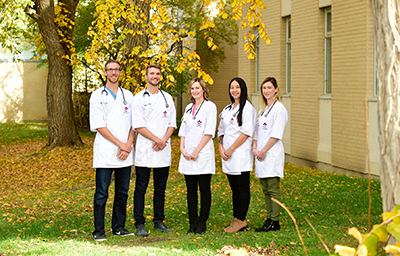
The four-year Doctor of Veterinary Medicine (DVM) is offered by the University of Saskatchewan's Western College of Veterinary Medicine (WCVM).
Established in 1963, the WCVM is the premier centre of veterinary education, research and clinical expertise. It serves as the regional veterinary college for Canada’s western provinces and the northern territories. As one of Canada’s five veterinary colleges, the WCVM is a key member of Canada’s veterinary, public health and food safety networks.
Related programs
If you are looking for graduate level (master's or Ph.D.) programs please consult our graduate students' website.

Questions?
Tel: 306-966-7459
Email: wcvm.admissions@usask.ca
Admissions Office
Western College of Veterinary Medicine
University of Saskatchewan
52 Campus Drive
Saskatoon, SK S7N 5B4



